US attack sub, Canada navy patrol ship arrive in Cuba on heels of Russian warships
Fri, June 14, 2024
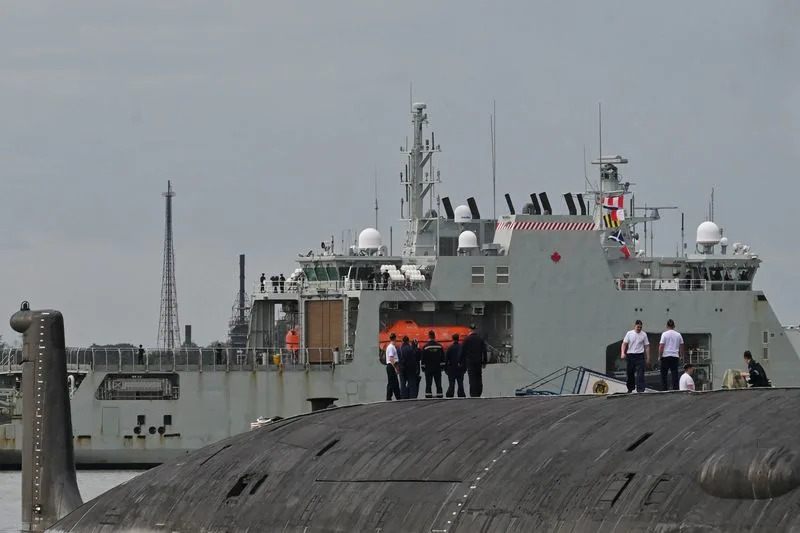
US attack sub, Canada navy patrol ship arrive in Cuba on heels of Russian warships
By Dave Sherwood
HAVANA (Reuters) -A Canadian navy patrol ship sailed into Havana early on Friday, just hours after the United States announced a fast-attack submarine had docked at its Guantanamo naval base in Cuba, both vessels on the heels of Russian warships that arrived on the island earlier this week.
The confluence of Russian, Canadian and U.S. vessels in Cuba - a Communist-run island nation just 145 km (90 miles) south of Florida - was a reminder of old Cold War tensions and fraught ties between Russia and Western nations over the Ukraine war.
However, both the U.S. and Cuba have said the Russian warships pose no threat to the region. Russia has also characterized the arrival of its warships in allied Cuba as routine.
The Admiral Gorshkov frigate and the nuclear-powered submarine Kazan, half submerged with its crew on deck, sailed into Havana harbor on Wednesday after conducting "high-precision missile weapons" training in the Atlantic Ocean, Russia's defence ministry said.
Canada`s Margaret Brooke patrol vessel began maneuvers early on Friday to enter Havana harbor, part of what the Canadian Joint Operations Command called "a port visit ... in recognition of the long-standing bilateral relationship between Canada and Cuba."
Hours earlier, the U.S. Southern Command said the fast-attack submarine Helena had arrived on a routine port visit to Guantanamo Bay, a U.S. naval base on the tip of the island around 850 km (530 miles) southeast of Havana.
"The vessel's location and transit were previously planned," Southern Command said on X.
Cuba`s foreign ministry said it had been informed of the arrival of the U.S. submarine but was not happy about it.
"Naval visits to a country are usually the result of an invitation, and this was not the case," said Vice Foreign Minister Carlos Fernández de Cossío.
"Obviously we do not like the presence in our territory (of a submarine) belonging to a power that maintains an official and practical policy that is hostile against Cuba."
A Canadian diplomat characterized the Margaret Brooke`s arrival as "routine and part of long-standing cooperation between our two countries", adding it was "unrelated to the presence of the Russian ships."
Russia and Cuba were close allies under the former Soviet Union, and tensions with Washington over communism in its "backyard" peaked with the Cuban Missile Crisis of 1962. Moscow has maintained ties with Havana.
When asked what message Moscow was sending, Russian Foreign Ministry spokeswoman Maria Zakharova said on Thursday the West never appeared to take notice when Russia sent signals through diplomatic channels.
"As soon as it comes to exercises or sea voyages, we immediately hear questions and a desire to know what these messages are about," Zakharova said. "Why do only signals related only to our army and navy reach the West?"
The Russian warships are expected to remain in Havana harbor until Monday.
(Reporting by Dave Sherwood; Additional reporting by Marc Frank; Editing by Frances Kerry and Cynthia Osterman)
Canadian warship sharing an anchorage with Russian vessels in Cuba

US attack sub, Canada navy patrol ship arrive in Cuba on heels of Russian warships
By Dave Sherwood
HAVANA (Reuters) -A Canadian navy patrol ship sailed into Havana early on Friday, just hours after the United States announced a fast-attack submarine had docked at its Guantanamo naval base in Cuba, both vessels on the heels of Russian warships that arrived on the island earlier this week.
The confluence of Russian, Canadian and U.S. vessels in Cuba - a Communist-run island nation just 145 km (90 miles) south of Florida - was a reminder of old Cold War tensions and fraught ties between Russia and Western nations over the Ukraine war.
However, both the U.S. and Cuba have said the Russian warships pose no threat to the region. Russia has also characterized the arrival of its warships in allied Cuba as routine.
The Admiral Gorshkov frigate and the nuclear-powered submarine Kazan, half submerged with its crew on deck, sailed into Havana harbor on Wednesday after conducting "high-precision missile weapons" training in the Atlantic Ocean, Russia's defence ministry said.
Canada`s Margaret Brooke patrol vessel began maneuvers early on Friday to enter Havana harbor, part of what the Canadian Joint Operations Command called "a port visit ... in recognition of the long-standing bilateral relationship between Canada and Cuba."
Hours earlier, the U.S. Southern Command said the fast-attack submarine Helena had arrived on a routine port visit to Guantanamo Bay, a U.S. naval base on the tip of the island around 850 km (530 miles) southeast of Havana.
"The vessel's location and transit were previously planned," Southern Command said on X.
Cuba`s foreign ministry said it had been informed of the arrival of the U.S. submarine but was not happy about it.
"Naval visits to a country are usually the result of an invitation, and this was not the case," said Vice Foreign Minister Carlos Fernández de Cossío.
"Obviously we do not like the presence in our territory (of a submarine) belonging to a power that maintains an official and practical policy that is hostile against Cuba."
A Canadian diplomat characterized the Margaret Brooke`s arrival as "routine and part of long-standing cooperation between our two countries", adding it was "unrelated to the presence of the Russian ships."
Russia and Cuba were close allies under the former Soviet Union, and tensions with Washington over communism in its "backyard" peaked with the Cuban Missile Crisis of 1962. Moscow has maintained ties with Havana.
When asked what message Moscow was sending, Russian Foreign Ministry spokeswoman Maria Zakharova said on Thursday the West never appeared to take notice when Russia sent signals through diplomatic channels.
"As soon as it comes to exercises or sea voyages, we immediately hear questions and a desire to know what these messages are about," Zakharova said. "Why do only signals related only to our army and navy reach the West?"
The Russian warships are expected to remain in Havana harbor until Monday.
(Reporting by Dave Sherwood; Additional reporting by Marc Frank; Editing by Frances Kerry and Cynthia Osterman)
Canadian warship sharing an anchorage with Russian vessels in Cuba
CBC
Sat, June 15, 2024
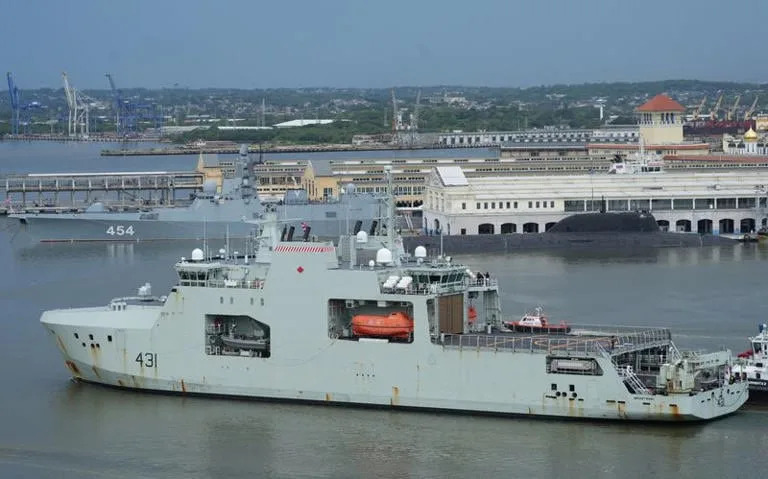
Canadian navy patrol boat HMCS Margaret Brooke passes by Russian nuclear-powered cruise missile submarine Kazan and frigate Admiral Gorshkov as it enters Havana's bay in Cuba on Friday. (Alexandre Meneghini/Reuters - image credit)
The Royal Canadian Navy now finds itself in the unusual position of both shadowing Russian warships as a threat in the Caribbean and sharing an anchorage with them as a guest in the port of Havana — because Canada accepted an invitation to send a patrol ship to Cuba while the Russian navy is in town.
And it's not clear just who in government or the military knew about the invitation from Cuba. The Caribbean nation has been a full-throated supporter of Russian President Vladimir Putin's war on Ukraine and Cubans have been fighting alongside Russian soldiers in that country.
For several days, the frigate HMCS Ville de Québec has been tasked with shadowing the Russian ships, which conducted missile exercises during their Atlantic crossing using Moscow's new Zircon hypersonic missiles. The Ville de Québec is part of a three-ship group that tracked the Russians, along with the U.S. destroyer USS Truxton and U.S. Coast Guard cutter USCGS Stone.
A Canadian CP-140 surveillance plane flying out of Jacksonville, Florida is also keeping a close eye on the Russians. The destroyer USS Donald Cook also appears to have joined the mission in the Caribbean, in addition to U.S. naval surveillance aircraft.
And yet on Friday, Canada's Harry DeWolf-class offshore patrol vessel HMCS Margaret Brooke sailed into Havana as a guest of the Revolutionary Armed Forces of Cuba, just hours after the Russian flotilla docked in the same harbour.
Cuba invited the Canadians to Havana to celebrate "the long-standing bilateral relationship between Canada and Cuba," according to a tweet by Canadian Joint Operations Command.
No Canadian naval vessel had visited Cuba for more than 50 years until Justin Trudeau came to power at the end of 2015.
In November 2016, he visited Havana hoping to meet the dying Fidel Castro. That didn't happen but Trudeau did publicly embrace Raul Castro and the Castro brothers' chosen successor, Miguel Diaz-Canel, and called Cuba an "ally" of Canada during a talk at the University of Havana.
Three days later, the frigate HMCS Fredericton set sail for Havana for a visit then-defence minister Harjit Sajjan said would celebrate the "strong, positive and productive relationship" between Cuba and Canada.
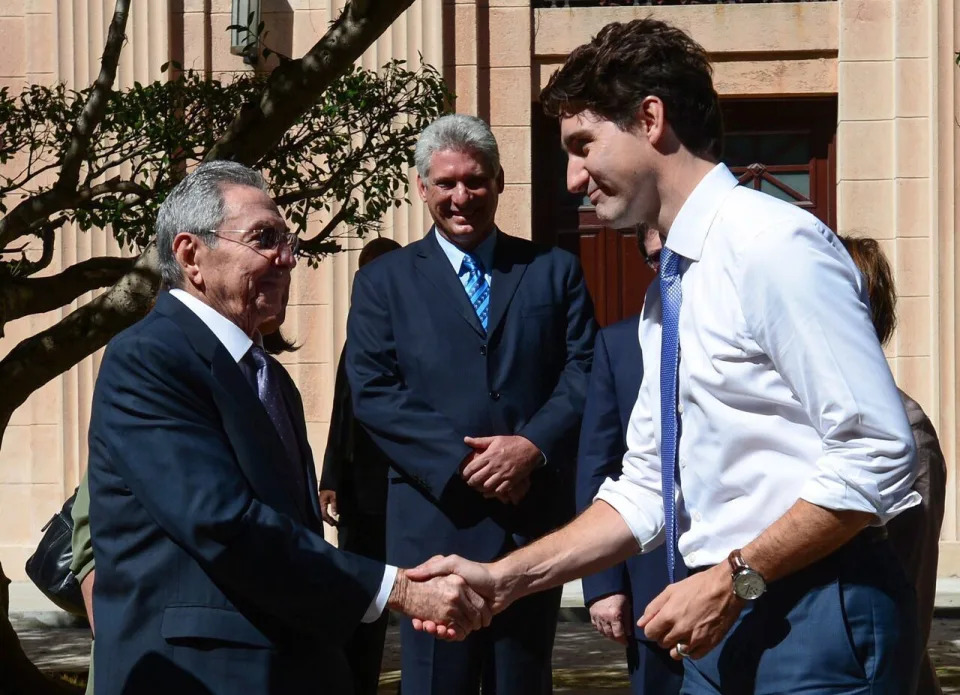
A beaming Miguel Diaz-Canel looks on as Canada's Justin Trudeau shakes hands with Raul Castro in Havana on Nov. 16, 2016. Castro introduced Trudeau to the man who would replace him as president two years later.
A beaming Miguel Diaz-Canel looks on as Prime Minister Justin Trudeau shakes hands with Raul Castro in Havana on Nov. 16, 2016. (Sean Kilpatrick/The Canadian Press)
The Trudeau government's relationship with the Cuban Communist Party regime has frequently drawn criticism from Canada's Cuban community. When Cubans took to the streets to demand the end of the 62-year dictatorship on July 11, 2021, Cuban-Canadians accused the Trudeau government of downplaying their political demands and attempting to misrepresent Cubans' demands for democracy as mere gripes about shortages of food and medicines.
The Margaret Brooke is the first Canadian warship to visit Havana since the Fredericton, and the second to visit Cuba (HMCS Charlottetown stopped in Santiago de Cuba in 2018). Many in the Cuban-Canadian community say it's less appropriate than ever for Canada to appear to bolster the Cuban regime in the wake of a harsh crackdown on dissidents that has seen the return of decades-long sentences for political prisoners.
They also cite Cuba's new and far-reaching alliance with Putin's Russia. Moscow's footprint in Cuba — which includes the re-opened Lourdes spy base — is now bigger than it has been since the end of the Cold War.
Mixed messages from Canada
It was initially unclear who in the Canadian government authorized the Havana visit or who knew that the Margaret Brooke had been invited at the same time as the Russians.
However, a spokesperson for Defence Minister Bill Blair said on Saturday that the minister authorized the port visit "on the advice of the Navy and the Canadian Joint Operations Command."
"We believe that this marked an especially important time to show a Canadian presence in the region," Daniel Minden said in a statement.
On Friday, a spokesperson for the Department of National Defence (DND) told CBC News that the department was aware the Russians would be in the Havana port on the same days as the Canadians.
But when asked about the visit on CBC's Power and Politics on Thursday evening, Foreign Affairs Minister Mélanie Joly told host David Cochrane she knew nothing about it.
"This is something I have to look more closely into," she said. "This is information that is news to me."
Four hours later, Global Affairs Canada spokesperson John Babcock suggested that the Cuba visit was part of a deliberate departmental strategy.
"Amidst global insecurity, Canada believes in pragmatic diplomacy to engage countries of different perspectives while we continue to uphold our values and interests and defend the international rules-based order," he told CBC News.
The friendly visit sends a confusing message about Canada's allegiances, said Russian political scientist Vladimir Rouvinski, director of the CIES Research Center at Icesi University in Colombia and an expert on Russia's presence in the Western hemisphere.
"I think it's a very unfortunate situation for Canada," he told CBC News. "It also shows that one has to be very careful when doing this kind of planning with Cuba" which, he said, "knew that Russians would come and Canada would come at the same time, of course."
Cuba has its own motives for wanting Canada to visit, said Rouvinski. "Cuba is interested in finding a way to pressure the Western countries to change their attitude towards Cuba," he said.
But by putting Canada in an embarrassing situation, he said, Cuba risks damaging its relationship with Ottawa.
The most obvious beneficiary of the situation is Russia, he said.
"There is a very important symbolic component in what is happening now in Havana Bay for Russia," he said. Russia, he argued, is sending NATO a message that if it's going to be in Russia's backyard, "Russia is capable of playing their own game in such a distant territory as the Western Hemisphere and the Caribbean."
Causing embarrassment to Canada, and creating the impression that western allies are divided over Russia, makes the symbolism even more valuable to Moscow, he added.
"It's also the message to be able to say who is controlling what," said Rouvinski.
Visit gives a boost to Communist Party
Eloy Viera is a Cuban independent journalist with the publication El Toque, a popular online publication on the island that annoys Cuban authorities by publishing black market exchange rates for dollars and euros.
He said the Communist Party will use the Canadian visit domestically to try to show the Cuban people the country is not diplomatically isolated.
"The image they want to send to the world is, 'We are with everyone, we are close to Russia, but at the same time we are also close to one of its adversaries, in this case Canada," he said.
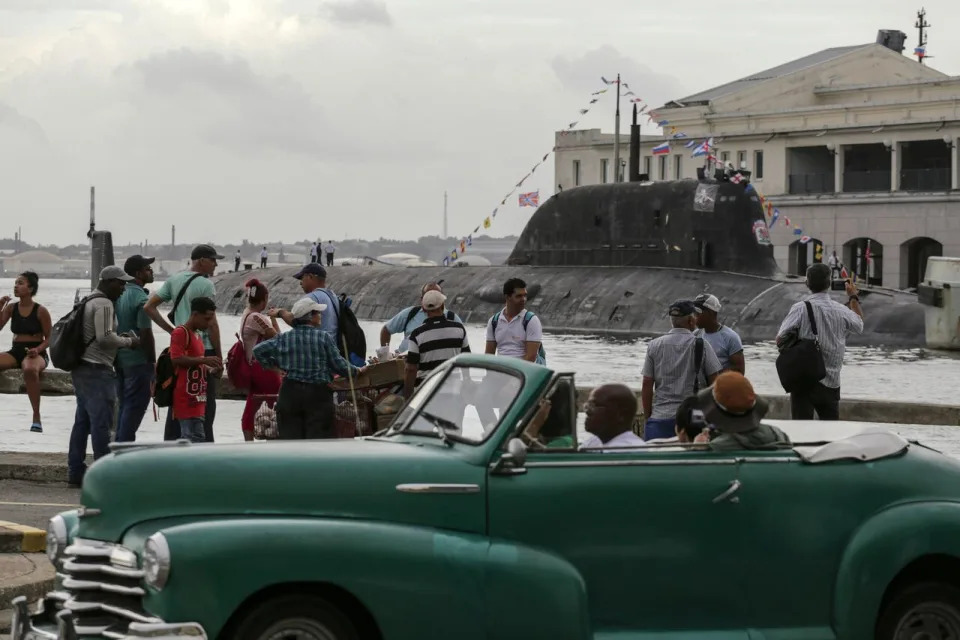
A convertible American classic car drives by as people watch the Russia's Kazan nuclear-powered submarine arrive in the port of Havana, Cuba, Wednesday, June 12, 2024. A fleet of Russian warships arrived in Cuban waters Wednesday ahead of planned military exercises in the Caribbean.
A classic American convertible drives by as people watch Russia's Kazan nuclear-powered submarine arrive in the port of Havana on Wednesday. (Ariel Ley/The Associated Press)
Viera said Canada was unwise to accept the invitation.
"That's one of the main problems when a democratic government like Canada's deals with an autocratic regime like Cuba's — you are taking the risk to be manipulated by someone that is a master in manipulation," he said.
"Everything is part of the game that right now is being handled from Havana. It's not handled from Ottawa, it's handled from Havana."
The U.S. has made no comment on Canada's presence in Havana port but on Thursday, as the Russian nuclear submarine Kazan sailed into Havana, the U.S. nuclear-powered sub USS Helena slipped into the American base at Guantanamo Bay, a move Cuba's Foreign Minister Bruno Rodrgiuez called a "provocative escalation."
'Nothing happens by coincidence'
Juan Antonio Blanco Gil is a former Cuban diplomat and historian who lives in Miami and has written extensively about Cuba's foreign policy.
"Nothing happens by coincidence and the Russians were planning this with the Cubans," he told CBC News. Had the Cubans been interested in sparing the Canadians from an awkward cohabitation with the Russian flotilla, he said, "it would have been very easy to change the date a little bit before or after the event of the Russians.
"They didn't. So there was a point in trying to bring together these two forces in Havana."
The Russian ships are expected to leave Cuba on Monday and head for Venezuela, where the Nicolas Maduro government is another major backer of Putin and the war in Ukraine.
"The Canadian Armed Forces will continue to track the movements and activities of the Russian naval flotilla" after it departs Havana, Kened Sadiku of DND told CBC News.
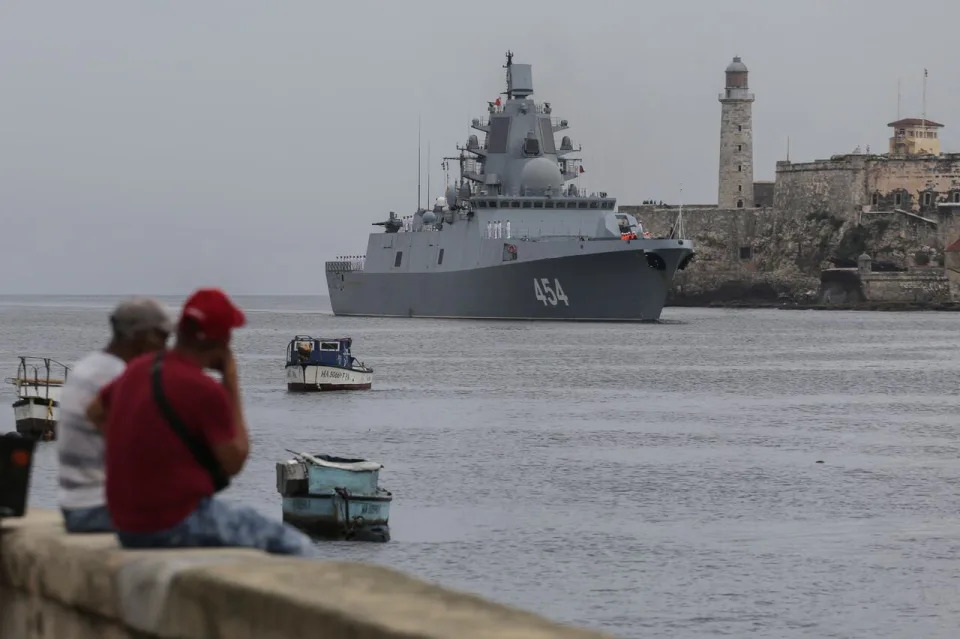
People watch the Russian Navy Admiral Gorshkov frigate arrive at the port of Havana, Cuba on Wednesday, June 12, 2024. A fleet of Russian warships reached Cuban waters on Wednesday ahead of planned military exercises in the Caribbean.
People watch the Russian frigate Admiral Gorshkov frigate arrive at the port of Havana on Wednesday. A fleet of Russian warships reached Cuban waters on Wednesday ahead of planned military exercises in the Caribbean. (Ariel Ley/The Associated Press)
Blanco said both the Cuban and the Venezuelan regimes face a difficult summer and have reasons for wanting the Russian ships close by.
The Maduro regime agreed to hold elections this year as part of a deal to escape sanctions, although that deal fell apart in April. While Maduro has banned the main opposition candidate from running, and few expect a genuinely free vote, his United Socialist Party knows it faces a major challenge.
White House, Pentagon might have to think twice
"They want the Russians to show the flag in the Caribbean for two reasons. The Venezuelans, because they have a very difficult political crisis with the coming election, and the Cubans who are going through the worst economic, social, political crisis of the last 65 years," said Blanco.
"They are also asking this fleet to be there because if they have to eventually use lethal force to contain demonstrations ... they would like the Russians to be around to complicate decisions in the White House and the National Security Council."
Blanco said that if the U.S. wished to retaliate against either country for some crackdown, "they would have to think twice if they have Russians in the middle of the Caribbean Sea going around. I think that that is the calculation of the Cubans."
Although U.S. intelligence has assessed that neither the Zircon missiles on the Admiral Gorshkov nor the Kalibr missiles on the Kazan are fitted with nuclear warheads (though both are nuclear-capable), Blanco said he believes Havana would like to persuade the Kremlin to change that posture.
"What the Cubans are dreaming of, and what they're working for, is to inspire Putin into placing a continuous nuclear presence in Cuba through the fleet," he said.
Blanco points out that Russia has every right to send its ships fully-armed anywhere in international waters, and can even transit the Panama Canal with nuclear weapons aboard.
By simply rotating vessels such as the Gorshkov or the Kazan through the region, he said, Cuba could threaten the continental U.S. with more megatons of close-range missiles than it could have using all the land-based missiles it had in 1962.
"You don't need to re-enact the October (Cuban missile) crisis," he said.
Friendly feelings may be one-sided
Blanco said there continues to be a mismatch between Canada's friendly and trusting approach to the Cuban Communist Party and Havana's more pragmatic view of Canada.
"The Cubans have very clear in their mind who are their enemies — the United States and the West, and that includes Canada, like it or not," he said. "The Canadians have never really digested that they are seen in Havana as the enemy, as being part of the enemy because they're part of the West ... they're in an alliance with the United States."
Havana can use Canada's pride in its independent foreign policy on Cuba to drive a wedge between the two NATO allies at a time when both Russia and Cuba are moving closer because of the war in Ukraine, Blanco said.
"In the minds of the Cuban elite, Canada is not a friend, it's a country that they can — I don't want to use the word manipulate, but they can kind of dance around and make them act in ways that would not align totally with the main enemy, which obviously is the United States," he said.
"The Canadians, from their view, believe that all these gestures are going to be constructive and help to bring the Cuban elite to their senses and have them open up to a peaceful transition. I am positive that they believe so and I'm positive that they are wrong in that calculation, unfortunately.
"I would love them to be right, but unfortunately from my perspective, I don't think that they are."
U.S. debated canceling sub deployment to Cuba after learning of Russia’s warship plans
Michael Wilner
Fri, June 14, 2024
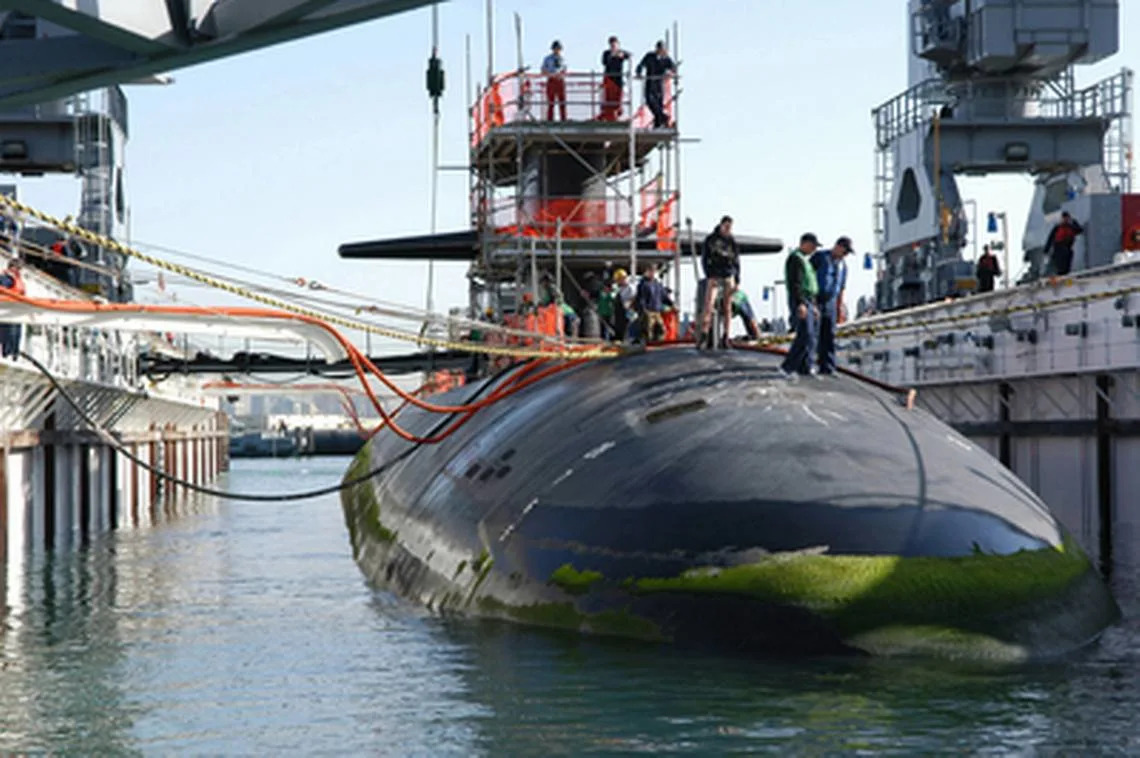
Plans by the U.S. Navy to deploy a nuclear submarine to Cuba this week were considered so routine, little thought was given to the move within the U.S. government — until the Biden administration learned of Russia’s plans to dock one of its own in Havana at the same time.
The Navy had planned for weeks to deploy the USS Helena, a nuclear-powered, fast- attack submarine, to the Guantanamo Bay Naval Base as “part of our routine naval activities,” one official with U.S. Southern Command, based in Doral, said.
But the discovery that Russia intended to send several combat vessels and the Kazan — one of its most advanced nuclear submarines — to the region for military exercises this week sparked a debate among Navy and administration officials whether to proceed with the Helena deployment, or to change or cancel it, two officials familiar with the matter told McClatchy and the Miami Herald.
“There was a discussion over whether to proceed,” one official familiar with the matter said.
Biden administration officials had already believed that Cuba approved Russia’s latest port call “at least in part because of Havana’s displeasure” over a similar event last year, in which a U.S. submarine visited the Guantanamo base, infuriating the Cuban government, one U.S. official said. Officials feared that a second visit, announced during the Russian exercises, could escalate tensions further.
Ultimately, the Navy argued that changing or canceling a U.S. military deployment to accommodate the movements of another power would set a bad precedent.
“We see no reason to alter previously planned, routine activity in response to Russian activity in the region,” said the Southcom official, who noted that Cuba was provided notice of Helena’s arrival.
The internal debate reflects sensitivities around a set of military maneuvers that would, in most other circumstances, be viewed as routine. The Cuban, Russian, and U.S. governments have all put out statements making clear that their actions are not intended to pose a threat to their adversaries.
Yet an increase in tensions between Moscow and Washington over U.S. support for Ukraine, and Russia’s decision to deploy naval combat vessels within 30 miles of U.S. shores, has contributed to the sense that these movements may be different.
Jake Sullivan, the U.S. national security advisor, told reporters on Wednesday that the current Russian exercises were “distinct” due to the inclusion of the Kazan.
“They have a submarine associated with this port visit that they have not had before,” Sullivan said, “But fundamentally, the notion that Russia takes some of its Russian naval assets and does a port visit to Havana is something that we’ve seen before.”
“It’s something we watch closely, carefully,” he added. “We will see how this unfolds in the coming days.”
The Russian flotilla could move south through the Caribbean, down to Venezuela, as soon as next week.
US nuclear-powered submarine arrives in Guantanamo Bay a day after Russian Navy docks in Havana
Sam Simpson and Oren Liebermann, CNN
Fri, June 14, 2024
The USS Helena, a fast-attack nuclear submarine, surfaced in Guantanamo Bay, Cuba, a day after Russian naval forces arrived in Havana to conduct drills with the island nation, a Russian ally.
In a statement posted on X, US Southern Command said, “The fast-attack submarine USS Helena is in Guantanamo Bay, Cuba as part of a routine port visit as it transits the U.S. Southern Command geographic area of responsibility while conducting its global maritime security and national defense mission.”
The specific movements of Navy submarines are highly classified and are rarely disclosed publicly.
The Pentagon has reiterated the presence of the Russian flotilla, despite its being 90 miles from the coast of Florida, does not pose a threat to the security of the United States. Navy destroyers, as well as P-8 submarine hunting aircraft, tracked the movements of the Russian ships as they made their way south off the east coast of the United States.

People watch a ship belonging to the Russian Navy flotilla arrive at the port of Havana on Wednesday, June 12, 2024, in Havana, Cuba. - Yander Zamora/Anadolu/Getty Images
“We’ve been tracking the Russians’ plans for this. This is not a surprise. We’ve seen them do this — these type of port calls before, and these are, you know, routine naval visits that we’ve seen under different administrations,” said Pentagon spokesperson Sabrina Singh.
She added, “We’re always, constantly going to monitor any foreign vessels operating near US territorial waters. We of course take it seriously, but these exercises don’t pose a threat to the United States.”
The Norfolk-based USS Helena is a Los Angeles-class, fast-attack, nuclear-powered submarine, first commissioned in the 1980s. It is designed to surveil and respond to threats globally.
The USS Pasadena, another Los-Angeles class fast attack submarine, stopped in Guantanamo Bay last July, sparking furor from the Cuban government, which called it an escalation. The Pentagon said the current visit of a Russian submarine to Cuba was “at least in part” a response to last year’s visit of a US submarine.
Russia says the US doesn't have any reason to worry about the nuclear submarine and the massive warship its navy has cruising off the coast of Cuba
Aditi Bharade
Thu, June 13, 2024
The Kremlin has said that its navy vessels stationed off of Cuba pose no threat.
The submarine and navy frigate sailed there for military exercises in the Caribbean.
Russia's assurances come despite the fact that the vessels are some of Moscow's most lethal assets.
The arrival of powerful missile-capable naval assets in Cuban waters should not set off alarm bells, Russia said to the US.
A navy frigate and the nuclear-powered submarine pulled into Cuba's coast near Havana on Wednesday, ahead of air and military exercises in the Caribbean. Along with two other vessels, these Russian navy assets were scheduled to be stationed in Cuba for a five-day visit.
"This is a normal practice for all states, including such a large maritime power as Russia," Kremlin spokesman Dmitry Peskov told reporters, per Reuters. "So we don't see any reason to worry in this case."
Russia's reassurances that the vessels in Cuba pose no harm come in spite of the fact that they are some of the Kremlin's most lethal military assets.
For one, the Kazan submarine currently near Havana is one of the new Severodvinsk class vessels. The submarines in this class are hard to detect and have a dangerous combination of stealth and striking power — and as such, have vexed the US and NATO for years.
Also in Cuba is the Admiral Gorshkov Russian frigate, which is armed to the teeth with Putin's prized Zircon scramjet-powered hypersonic cruise missiles. The weapons, which the Kremlin claims are unbeatable, are relatively new in Moscow's arsenal.
The Cuban foreign ministry, for its part, echoed Russia's sentiments, saying that the vessels pose no threat, per Reuters.
In a press conference on Tuesday, Pentagon Press Secretary Sabrina Singh said that the Department of Defense is monitoring the situation, but does not anticipate any threat from the warships.
"Again, I think what's important here is that what Russia is doing in these exercises, they don't pose a threat to the United States, but of course we're going to continue to monitor," she said.
The arrival of the ships is largely seen as a flex by Russia to compensate for its major losses in the Black Sea.
In April, Ukraine said that it used drones, missiles, and other weapons in its arsenal to destroy many Russian warships.
And while US officials may be quick to say there's no immediate threat, the Los Angeles-class USS Helena attack submarine US attack submarine sailed up to Guantanamo Bay — about 500 miles away from the Russian vessels on Thursday — shortly after Russia's Kazan sub showed up.
The US Southern Command said in a statement on X on Thursday that the sub was there as part of a routine port visit.
Representatives for the US Southern Command and Russian defense ministry didn't immediately respond to a request for comment from Business Insider sent outside regular business hours.
No comments:
Post a Comment